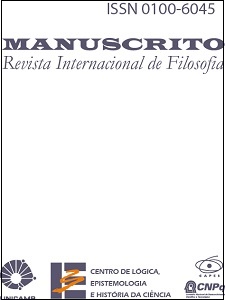Resumo
O objetivo deste artigo é mostrar que a plasticidade do sentido, o fato de que os exemplares de um tipo, freqüentemente, não expressam o mesmo Sinn, não constitui uma ameaça para a comunicação lingüística humana. A primeira parte apresenta o fenômeno da plasticidade do sentido. Tentarei mostrar que a noção de significado apropriada para as línguas naturais não é aquela desenvolvida na semântica lógica; o significado, nas línguas naturais, não é estável, fixado de uma vez por todas. Conseqüentemente, o que é dito em uma enunciação não é algo determinado exclusivamente pelo significado literal. A segunda parte mostra que a plasticidade do sentido era conhecida nas teorias ideacionais da linguagem, particularmente a de Arnauld & Nicole. A terceira parte introduz as noções de Plano e Leitura de mente e mostra como elas contribuem a explicar o sucesso da comunicação.
Abstract:
The aim of this paper is to show that the plasticity of sense, the fact that tokens of the same type frequently express different Sinne, does not constitute a threat to human linguistic communication. The first part presents the phenomenon. I try to make clear that the appropriate notion of meaning for natural languages is not the one developed in logical semantics; meanings in natural languages are not fixed once and for all, stable. Consequently, What Is Said by an utterance is not something determined exclusively by literal meaning. The second part shows that the plasticity of sense was known in the ideational theories of language, especially that of Arnauld & Nicole. The third part introduces the notions of Plan and Mindreading and show how they contribute to the success of communication.
Keywords: Plasticity of sense. Contextualism. Ideational theory of language. What is said. Pragmatics.
Referências
ARNAULD, A., NICOLE, P. [1669-1672]. La Grande Perpétuité de la foi de l’Eglise catholique sur l’Eucharistie, [G.P.], publiée par l’Abbé M***. Paris: Imprimerie de Migne, chez l’éditeur rue d’Ambroise, Hors la barrière d’Enfer, 1841.
ARNAULD, A., NICOLE, P.. [1662]. La Logique ou l’Art de penser. Edited by P. Clair and F. Girbal. Paris: Presses Universitaires de France, 1965.
AUSTIN, J. L. [1950]. “Truth”. Philosophical Papers. Oxford: Clarendon Press. Third edition, 1979.
BEZUIDENHOUT, A. “Truth-Conditional Pragmatics”. Philosophical Perspectives, 16, pp. 105-134, 2002.
BRATMAN, M. Intention, Plans, and Practical Reason. Stanford: CSLI Publication, third edition, 1999.
BURGE, T. “Individualism and the Mental”. Midwest Studies in Philosophy, 10. Edited by P. French, T. Uehling and H. Wettstein. Minneapolis: University of Minnesota Press, pp. 73-121, 1979.
CHOMSKY, N. New Horizons in the Study of Language and Mind. Cambridge: Cambridge University Press, 2000.
CONDILLAC, Étienne Bonnot de [1775]. De l’Art d’écrire. In : Vol. 1 of Oeuvres Philosophiques, tome XXXIII of the Corpus général des philosophes. Paris: Presses Universitaires de France, 1947.
CONDILLAC, Étienne Bonnot de. La Langue des Calculs. In: Oeuvres Philosophiques de Condillac, Tome II, Tome XXXIII du Corpus général des philosophes français. Edited by G. Le Roy. Paris: Presses Universitaires de France, 1948.
DAVIDSON, D. “A Nice Derangement of Epitaphs”. In: E. Lepore (ed.) (1986), pp. 433-446.
DU MARSAIS, C. C. [1730]. Traité des Tropes. Paris: Ed. Nouveau Commerce, 1977.
FREGE, G. “On Sense and Reference”. In: A.W. Moore (ed.) (1993), pp. 23-42.
GOLDMAN, A. I. Simulating Minds. The Philosophy, Psychology and Neuroscience of Mindreading. Oxford: Oxford University Press, 2006.
LECLERC, A. “Communication, Linguistic Understanding and Minimal Rationality in the Tradition of Universal Grammar”. In: D. Vanderveken (ed.). Logic, Thought and Action. Dordrecht: Springer, pp. 133-150, 2005.
LEPORE, E. (ed.). Truth and Interpretation: Perspective on the Philosophy of Donald Davidson. Oxford: Basil Blackwell, 1986.
LEPORE, E., CAPPELEN, H. Insensitive Semantics. Oxford: Blackwell, 2005.
MONTMINY, M. “Semantic Content, Truth-Conditions and Context”. Linguistics and Philosophy, 29(1), pp. 1-26, 2006.
MOORE, A. W. (ed.). Meaning and Reference. Oxford: Oxford University Press, 1993.
MORAVCSIK, J. Meaning, Creativity and the Partial Inscrutability of the Human Mind. Stanford: CSLI Publications, 1998.
PEIRCE, C. S. [1878]. “How to make our Ideas Clear”. Popular Science Monthly, 12, January, pp. 286-302, 1878.
PESSIN, A., GOLDBERG, S. (eds.). The Twin Earth Chronicles. Armonk, NY: M. E. Sharpe, 1996.
PUTNAM, H. [1975]. “The Meaning of ‘Meaning’”. In: A. Pessin and S. Goldberg (eds.) (1996), p. 23.
PUTNAM, H. The Threefold Cord. Mind, Body, and World. New York: Columbia University Press, 1999.
RECANATI, F. Literal Meaning. Cambridge: Cambridge University Press, 2004.
REICHENBACH, H. [1947]. Elements of Symbolic Logic. New York: The Free Press, 1966.
RUSSELL, B. [1940]. An Inquiry into Meaning and Truth. Harmondsworth: Middlesex, 1969.
SEARLE, J. Speech Acts. Cambridge: Cambridge University Press, 1969.
SEARLE, J. Expression and Meaning. Cambridge: Cambridge University Press, 1979.
TRAVIS, C. “Meaning’s Role in Truth”. Mind, 105, 419, pp. 451- 466, 1996.
TRAVIS, C. Unshadowed Thought. Cambridge, Mass.: Harvard University Press, 2000.
TRAVIS, C. Thought’s Footing. Oxford: Oxford University Press, 2006.
WITTGENSTEIN, L. Zettel. Oxford: Blackwell, 1967.

